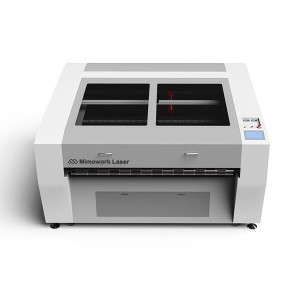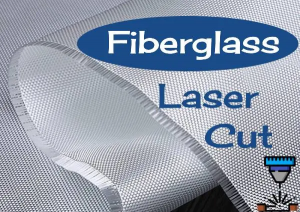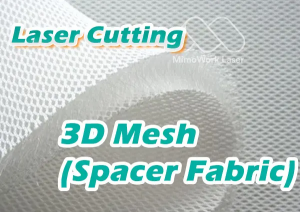Cutting fiberglass can be a challenging task if you don’t have the right tools or techniques. Whether you’re working on a DIY project or a professional construction job, Mimowork is here to help.
With years of experience serving clients across various industries, we’ve mastered the safest and most effective methods to cut fiberglass like a pro.
By the end of this guide, you’ll have the knowledge and confidence to handle fiberglass with precision and ease, backed by Mimowork’s proven expertise.
Step-by-Step Guide to Cutting Fiberglass
▶ Choose the Right Laser Cutting Equipment
• Equipment Requirements:
Use a CO2 laser cutter or fiber laser cutter, ensuring the power is suitable for the thickness of the fiberglass.
Ensure the equipment is equipped with an exhaust system to effectively handle smoke and dust generated during cutting.
CO2 Laser Cutting Machine for Fiberglass
| Working Area (W *L) | 1300mm * 900mm (51.2” * 35.4 ”) |
| Software | Offline Software |
| Laser Power | 100W/150W/300W |
| Laser Source | CO2 Glass Laser Tube or CO2 RF Metal Laser Tube |
| Mechanical Control System | Step Motor Belt Control |
| Working Table | Honey Comb Working Table or Knife Strip Working Table |
| Max Speed | 1~400mm/s |
| Acceleration Speed | 1000~4000mm/s2 |
| Working Area (W * L) | 1600mm * 1000mm (62.9” * 39.3 ”) |
| Software | Offline Software |
| Laser Power | 100W/150W/300W |
| Laser Source | CO2 Glass Laser Tube or CO2 RF Metal Laser Tube |
| Mechanical Control System | Belt Transmission & Step Motor Drive |
| Working Table | Honey Comb Working Table / Knife Strip Working Table / Conveyor Working Table |
| Max Speed | 1~400mm/s |
| Acceleration Speed | 1000~4000mm/s2 |
▶ Prepare the Workspace
• Operate in a well-ventilated area to avoid inhaling harmful fumes.
• Ensure the work surface is flat and secure the fiberglass material firmly to prevent movement during cutting.
▶ Design the Cutting Path
• Use professional design software (such as AutoCAD or CorelDRAW) to create the cutting path, ensuring precision.
• Import the design file into the laser cutter’s control system and preview and adjust as needed.
▶ Set Laser Parameters
• Key Parameters:
Power: Adjust the laser power according to the material thickness to avoid burning the material.
Speed: Set an appropriate cutting speed to ensure smooth edges without burrs.
Focus: Adjust the laser focus to ensure the beam is concentrated on the material surface.
Laser Cutting Fiberglass in 1 Minute [Silicone-Coated]
This video shows that the best way to cut fiberglass, even if it’s silicone coated, is still using a CO2 Laser. Used as a protective barrier against sparks, spatter, and heat - Silicone coated fiberglass found its use in many industries. But, it can be tricky to cut.
▶ Perform a Test Cut
• Use scrap material for a test cut before the actual cutting to check the results and adjust parameters.
• Ensure the cut edges are smooth and free from cracks or burns.
▶ Proceed with the Actual Cutting
• Start the laser cutter and follow the designed cutting path.
• Monitor the cutting process to ensure the equipment operates normally and address any issues promptly.
▶ Fiberglass Laser Cutting - How to Laser Cut Insulation Materials
This video shows the laser cutting fiberglass and ceramic fiber and finished samples. Regardless of the thickness, the co2 laser cutter is competent to cut through the insulation materials and leads to a clean & smooth edge. This is why the co2 laser machine is popular in cutting fiberglass and ceramic fiber.
▶ Clean and Inspect
• After cutting, use a soft cloth or air gun to remove residual dust from the cut edges.
• Inspect the cut quality to ensure the dimensions and shapes meet the design requirements.
▶ Safely Dispose of Waste
• Collect the cut waste and dust in a dedicated container to avoid environmental contamination.
• Dispose of the waste according to local environmental regulations to ensure safety and compliance.
Mimowork’s Professional Tips
✓ Safety First: Laser cutting generates high temperatures and harmful fumes. Operators must wear protective goggles, gloves, and masks.
✓ Equipment Maintenance: Regularly clean the laser cutter’s lenses and nozzles to ensure optimal performance.
✓ Material Selection: Choose high-quality fiberglass materials to avoid issues that may affect cutting results.
Final Thoughts
Laser cutting fiberglass is a high-precision technique that requires professional equipment and expertise.
With years of experience and advanced equipment, Mimowork has provided high-quality cutting solutions to numerous clients.
By following the steps and recommendations in this guide, you can master the skills of laser cutting fiberglass and achieve efficient, precise results.
If you have any questions or need further assistance, feel free to contact the Mimowork team—we’re here to help!
Any Questions about Laser Cutting Fiberglass
Talk with Our Laser Expert!
Any Questions about Cutting Fiberglass?
Post time: Jun-25-2024






